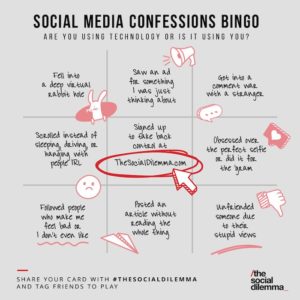ESL Level: Upper-intermediate (B2/C1) (Advanced here)
Lesson Topic: The health and societal problems caused by social media use
Skill Focus: Speaking, Reading, Vocabulary
Lesson Plan Download: social-media-dilemma-upper-intermediate-01104020.docx
Approximate Class Time: 3.5 hours
Notes:
- Teachers, this lesson is longer and denser than usual. Pick the activities that you feel will work for your class. This lesson summarizes the key ideas of The Social Dilemma (Netflix, 2020). If possible, watching the documentary itself would be a great pre- or post-activity.
- Students, feel free to read the lesson, do the vocabulary exercises, and leave your answers to the questions in the comment area below.

UPPER-INTERMEDIATE Social Media ESL Lesson Plan: Warm-up (Pair Work)
- Which websites do you use the most? What do you like most about them?
- What social networking platforms do you use? Why do you use them?
- Do you make an effort to limit your screen time? Why or why not?
- What social movements do you know that have become popular because of social media?
Reading: The Social Dilemma Documentary
The Social Dilemma is a video documentary that argues that social media companies are harming society. The video is mostly presented by insiders in the tech industry (Twitter, Facebook, YouTube, etc.) who confess to the harmful nature of the technology they helped design.
“If you’re not paying for the product, then you’re the product.”
The film clarifies that social media are not free platforms without a product. By using the system, the user and his attention become the product that advertisers aim to control. Although we fear these companies sell our data, social media companies carefully guard it for themselves in order to monetize us. The data collected is not only demographic—every click is measured by algorithms to better understand our behaviour. The end goal is a gradual change in our behaviour and way that we view the world. According to Harvard professor Shoshana Zuboff, this has made tech companies “the richest companies in the history of humanity.”
The Mental Health Dilemma
Justin Rosenstein created the Facebook Like button, which he believed would spread positivity. Such features provide us with social approval, which we tend to confuse with acceptance and truth. Sadly, the result is only a temporary joy that leaves us empty and depressed without it.
A study of 100,000 teenage girls in the U.S. found that hospital admissions for self-harm have increased by 62% in older teens and 189% in pre-teens (nearly triple). The same patterns exist for teen suicide. Social media became available on smartphones in 2009, and these changes began around 2010/2011.
The Democracy Dilemma
“If you want to control the population of your country, there has never been a tool as effective as Facebook.”
Social media is perhaps too efficient at reaching the best audiences for ads and campaigns. This allows bad actors such as political and hate groups to easily gain popularity and influence. Studies from MIT (2018) show that fake news spreads six times faster than true news. This leads to division in society as newsfeeds make us more extreme in our views. We also filter out ideas that don’t agree with our worldview. As a society, we lose touch with the shared facts and reality that connect us.
The documentary uses the Flat Earth movement to show how regular people can be influenced to adopt incredibly idiotic beliefs. The movement was popularized by a YouTube algorithm that recommended the video to hundreds of millions of people.
What do the film’s experts believe will happen in the future to society? Their answers include civil war and the end of civilization due to our own ignorance.
Social Media Lesson Plan: Comprehension Questions
- True or False: The article claims that social media companies are selling our data.
- In your own words, what is the `mental health' dilemma?
- What can we infer about the author's view on the cause of teenage health problems?
- Describe the “democracy dilemma” presented in the article in your own words.
- Does the author imply that Flat Earthers are in fact stupid?
- Which claims in the article do you agree with? Which do you disagree with?
- Do you agree with the article's thoughts on the future of society?
Possible Answers
1- False. He claims that companies are keeping the data for their own use.
3- By stating the correlation between the rise of health problems and the availability of social media on mobile phones, we can infer that the author believes social media has a causal role in creating these problems.
5-No. He suggests that they are regular people, but they have been manipulated by recommended content.
Vocabulary: Match the words from the article with their meaning.
| 1. insider (n) 2. confess (v) 3. platform (n) 4. guard (v) 5. demographic (adj/n) 6. gradual (adj) 7. influence (n) 8. extreme (adj) 9. filter (out) (v/phr. v) 10. lose touch (idiom) 11. idiotic (adj) 12. civilization (n) 13. ignorance (n) | a) related to statistical data about populations (e.g. age, income) b) an open area where people can share their views c) happening slowly d) very stupid e) to become unaware/uninformed about something/someone f) to admit to committing a crime or making a big mistake g) supporting serious ideas/actions not supported by ‘regular’ people h) to remove objects by passing it through a device/system i) a person with inside knowledge of an organization j) a human society with its own organization and culture k) the power to shape people’s views l) lack of intelligence m) to watch over; to protect |
Answers
1-i, 2-f, 3-b, 4-m, 5-a, 6-c, 7-k, 8-g, 9-h, 10-e, 11-d, 12-j, 13-l
Vocabulary Homework: Circle the words that were new to you. Add them to your vocabulary notebook and make sentences for homework.
Social Media Lesson Plan: Society for a Better Tomorrow (Group Work)
Background: You and your partners are scheduled to give a short presentation (5-8 minutes) on how to better manage social media use. In the audience will be members of government, concerned parents, and teenagers.
Task: Brainstorm ideas about how to address the issues presented by social media. Be sure to consider the three groups in your audience. When finished, organize your ideas and then present them to the class.
Social Media Lesson Plan: Debate
Student A: You believe that overall social media is good for society. Spend a few minutes thinking of ideas to support your position. When finished, start the debate.
Student B: You believe that overall social media is bad for society. Spend a few minutes thinking of ideas to support your position. Your partner will start the debate when ready.
Social Media Lesson Plan: “The Gift” Role-Play
Background: Student A is the teenage child of Student B. Pick a role and then read only your own role.
Student A: You are a teenager. You use social media for several important functions in your life. Your parent has asked to speak with you because s/he wants to give you a gift.
Student B: You worry that your teenager is addicted to technology. You have recently bought a gift that you will believe will greatly benefit his/her life: The Cell-Phone Jail. This product is a small cell in which you can lock a phone for a set amount of time. Present your gift to your teen and try to make rules about how you will use the cell-phone jail.
Social Media Lesson Plan: The Social Dilemma Recommendations
Discuss these recommendations presented by tech experts at the end of the documentary. Are they similar to your recommendations from your presentation? Which could you adopt?
- Recognizing the current problems and discussing them openly
- Uninstalling apps that waste time
- Turning off notifications
- Using a search engine that doesn't store search history instead of Google
- Putting more regulations on tech companies and taxing data assets to discourage companies from mining personal data
- Fact-checking the sources of an article before you share it
- Making an effort to read news from different points of view
- Not allowing children to use social media until 16 years of age
- Working out a time-budget with children about how many hours they can spend online
Social Media Lesson Plan: Social Media Confessions Bingo
(Instructions and card taken from https://www.thesocialdilemma.com/start-a-conversation/)
One Way to Play
- Circle your confessions, leaving the center blank
- Show your card to the group, and select one experience to share with the group
- As a group, discuss how you might reduce the negative effects of social media
- The winner is the person who makes a positive change in their life -or- the person who circles the fewest squares
Social Media ESL Lesson Plan: Bonus Discussion Questions
- Discuss this quotation: “Only drug dealers and software companies call their customers `users'” — Edward Tufte
- Is unconscious manipulation of the consumer any different from regular marketing and advertising?
- Does your country have a problem with `fake news'? Have you experienced fake news yourself?
- Do you feel the society you live in has become more and more polarized?
To take action to solve the social dilemma, watch the film and then visit https://www.thesocialdilemma.com/take-action/
--
-- EFL Lesson plan on social media written by Matthew Barton of EnglishCurrent.com (copyright excluding the bingo game which was taken from https://www.thesocialdilemma.com/start-a-conversation/). Site members may photocopy and edit the file for their classes. Permission is not given to rebrand the lesson, redistribute it on another platform, or sell it as part of commercial course curriculum. For questions, contact the author.
Comprehension question answers:
- False – the claim is that companies collect this data but do not share it. Rather, they hoard it for themselves so they can use it for monetization.
- (The issue is that social media seems to only provide an empty, temporary happiness. This can lead to depression when we need it for approval. The author suggests that self-harm and suicide-related data is connected to social media use.)
- The author is suggesting that the correlation between societal health issues and the introduction of smartphones has a causal connection.
- (Social media leads to polarization and entrenchment of views. It also enables the spread of fake information. This is harmful for democracies, which operate best when healthy debate and a plurality of views are allowed.)
- He describes them as ‘regular people’, suggesting that the same thing could happen to anyone.
- …
- …
Vocabulary answers: 1-d, 2-f, 3-b, 4-m, 5-a, 6-c, 7-k, 8-g, 9-h, 10-e, 11-d, 12-j, 13-l


This is brilliant, so well thought out and really engaging! I will use it as inspiration for my class tomorrow, thank you so much, much appreciated !
These are a lot of different and helpful ideas for how to use the film with my students.
Great lesson!
Thank you so much! Great ideas, the lesson is very involving and is good for students with different learning styles and habits
Thank you so much. So many things to use for the lesson in class.
This is very helpful to me in my psychology and health classes. Thank you so much for sharing you hard work :-)
Wow! Quality!
So useful. Thank tyou so much.
Head and shoulders above most ESL resources for this stage of development. Great! Thanks very much!
Fantastic lesson. Thanks
Wow! Really good stuff! Thanks a bunch for designing this fabulous lesson plan!